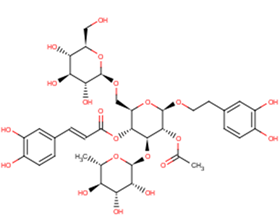
Tubuloside A
CAS No. 112516-05-9
Tubuloside A ( —— )
产品货号. M17826 CAS No. 112516-05-9
Tubuloside A (8.6 microM) 可以抑制 D-半乳糖胺诱导的肝细胞死亡。 Tubuloside A 具有 NO 自由基清除活性,这可能有助于其抗炎作用。
纯度: >98% (HPLC)
 COA
COA
 Datasheet
Datasheet
 HNMR
HNMR
 HPLC
HPLC
 MSDS
MSDS
 Handing Instructions
Handing Instructions
| 规格 | 价格/人民币 | 库存 | 数量 |
| 5MG | ¥648 | 有现货 |


|
| 10MG | ¥1094 | 有现货 |


|
| 25MG | ¥1806 | 有现货 |


|
| 50MG | ¥2665 | 有现货 |


|
| 100MG | ¥3985 | 有现货 |


|
| 200MG | 获取报价 | 有现货 |


|
| 500MG | 获取报价 | 有现货 |


|
| 1G | 获取报价 | 有现货 |


|
生物学信息
-
产品名称Tubuloside A
-
注意事项本公司产品仅用于科研实验,不得用于人体或动物的临床与诊断
-
产品简述Tubuloside A (8.6 microM) 可以抑制 D-半乳糖胺诱导的肝细胞死亡。 Tubuloside A 具有 NO 自由基清除活性,这可能有助于其抗炎作用。
-
产品描述Tubuloside A ( 8.6 microM) can inhibit D-galactosamine-induced death of hepatocytes. Tubuloside A has NO radical-scavenging activity, which possibly contributes to its anti-inflammatory effects.Tubuloside A shows stronger free radical scavenging activities than alpha-tocopherol on 1,1-diphenyl-2-picrylhydrazyl (DPPH) radical and xanthine/xanthine oxidase (XOD) generated superoxide anion radical (O2-.).
-
体外实验Tubuloside A is a phenylethanoid glycoside with antioxidative effect and hepatoprotective activity. Tubuloside A (8.6 μM) could inhibit D-GalN-induced death of hepatocytes.
-
体内实验——
-
同义词——
-
通路Others
-
靶点Other Targets
-
受体NOS
-
研究领域Others-Field
-
适应症——
化学信息
-
CAS Number112516-05-9
-
分子量828.77
-
分子式C37H48O21
-
纯度>98% (HPLC)
-
溶解度In Vitro:?DMSO : 50 mg/mL (60.33 mM)
-
SMILESOc1ccc(cc1O)/C=C/C(=O)O[C@@H]5[C@@H](CO[C@@H]2O[C@H](CO)[C@@H](O)[C@H](O)[C@H]2O)O[C@@H](OCCc3ccc(O)c(O)c3)[C@H](OC(C)=O)[C@H]5O[C@@H]4O[C@@H](C)[C@H](O)[C@@H](O)[C@H]4O
-
化学全称——
运输与储存
-
储存条件(-20℃)
-
运输条件With Ice Pack
-
稳定性≥ 2 years
参考文献
1.Xiong Q, et al. Antioxidative effects of phenylethanoids from Cistanche deserticola.Biol Pharm Bull. 1996 Dec;19(12):1580-5.
产品手册




关联产品
-
Inaxaplin
Inaxaplin 是一种载脂蛋白 L1 (APOL1) 功能抑制剂(WO2020131807,化合物 2)。 Inaxaplin 可用于肾脏疾病的研究。
-
HIV-1 TAT 48-60
HIV-1 TAT (48-60) is a cell-penetrating peptide derived from the human immunodeficient virus (HIV)-1 Tat protein residue 48-60. This is one of the cell-penetrating peptides generated from the human immunodeficient virus -1 Tat protein residue 48-60.
-
Verubulin
Verubulin (MPC-6827) 是一种高效、广谱的微管阻断剂,具有体内外细胞毒活性,有前景成为多种癌症的潜在候选药物。



 021-51111890
021-51111890 购物车()
购物车()
 sales@molnova.cn
sales@molnova.cn







